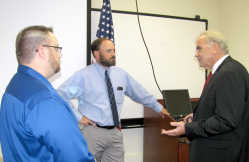Retail official: 'Click Cancer' threatens Nebraska communities

McCOOK, Neb. - Jim Otto, President of Nebraska Retail Federation, visited McCook Tuesday to discuss proposed state legislation to combat "click cancer," a term Otto used to describe the loss of sales tax revenue that Nebraska and cities like McCook are experiencing when online retailers do not collect and remit sales tax. The meeting, sponsored by McCook Chamber of Commerce, was attended by State Senator Dan Hughes and McCook City Manager Nate Schneider, as well as about a dozen McCook retailers and community leaders.
Currently, an online retailer is only required to collect sales tax in Nebraska if the business has a physical location within the state's borders, in which case the retailer is considered to have "nexus" within the state. Retailers like Amazon, which Otto says sold $266 million in Nebraska in 2014, are not required to collect sales tax from its Nebraska customers.
It is not that the tax is not owed to the state, Otto points out. Rather, the tax is to be collected from the buyer through self-reporting of the purchase on the consumer's Nebraska income tax return. Very few Nebraskans actually report their online purchases, so the tax goes uncollected. "I don't know of another tax that is out there and due that does not have a reasonable method of collection. It is too much to ask consumers to keep track of all their online purchases and report it on their state tax return," Otto explained.

The U.S. Supreme Court, in a 1992 decision, ruled that it was unconstitutional for states to require retailers to collect sales tax if the retailer did not have nexus within the state's border. The Court ruled that it was too burdensome for sellers to keep track of the thousands of taxing authorities that exist throughout the United States. According to Otto, computerization has advanced and the reporting burden is no longer a valid concern.
A total solution to the problem would require federal action, but gridlock has made that option frustrating. Instead, Otto is hoping that the Nebraska legislature, as well as other states, will address the issue in their next session, following South Dakota's lead.
The South Dakota state legislature is attempting to redefine nexus to include out-of-state retailers who sell over $100,000 annually or have 200 or more unique transactions within the South Dakota borders. South Dakota passed this legislation with the specific intention of challenging the Supreme Court's definition of nexus. They sent letters to 200 remote sellers informing them of the legislation and their requirement to collect and remit South Dakota sales tax, should the law be determined to be constitutional. As a result, 118 remote sellers have applied to South Dakota for a sales tax permit. One remote seller decided to stop selling to South Dakota residents.
The Nebraska Retail Federation is encouraging the Nebraska legislature to pass a similar action and join South Dakota in its challenge. Other states are also considering similar actions. "Once we get the bill introduced, there will be a hearing and we would like you all down to Lincoln to testify in favor of it," Otto said. State Senator Hughes indicated that he was in support of the legislation, which is still in the process of being written.
"Bricks," the term Otto uses to describe bricks and mortar businesses with physical locations within the state, get hit up every day to support local charities and sporting activities, and they are required to collect and remit the sales tax from consumers when they make a sale. "Clicks," the online retailers, like Amazon, Overstock.com, and eBay, are not required to collect the tax, putting the "bricks" at a tremendous disadvantage. According to Otto, Amazon sales alone account for the loss of over 1,600 retail jobs in Nebraska.
Otto said that the proposed legislation levels the playing field and helps local communities provide services to their residents. "If you're an online shopper, you need to recognize that sales tax is a huge portion of your city's and state's budget. It contributes to local fire, police, parks, and street departments. ... You need to shop local and pay the sales tax you owe. If you're one of those who decide not to shop local, but rather shop on Amazon to avoid the sales tax, don't call your local police and fire department, call Seattle's police and fire department; don't play in your local parks, go play in Seattle's parks, and while you're at it, don't drive on your local streets. ... I have one big question for you -- have you ever seen a local sports team with Amazon on their sports uniforms?"
Online Shopping
70% of Americans buy something online once a month
33% buy something online once a week
It is predicted that in 2017, Amazon will surpass Macy's as the #1 clothing retailer in the United States.
U.S. Senator Deb Fischer is committed to addressing the issue through federal legislation; U.S. Rep. Adrian Smith and Senator Ben Sasse are currently uncommitted.
